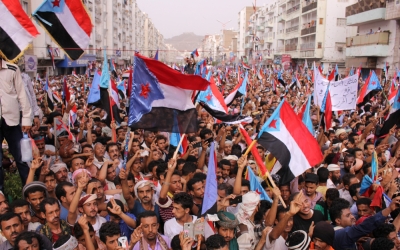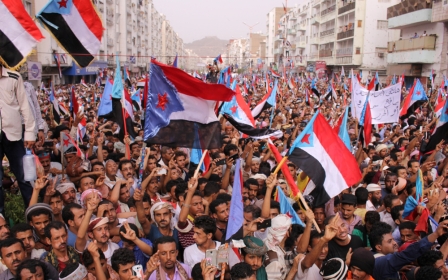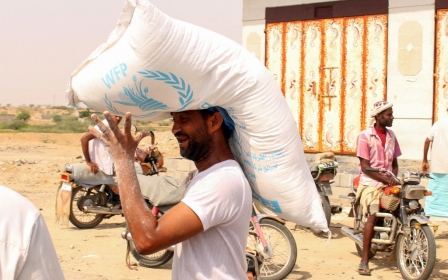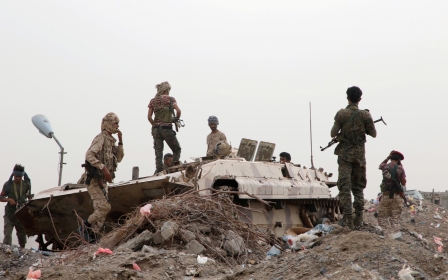Islamic State claims suicide attack in Yemen's Aden killing six separatist fighters
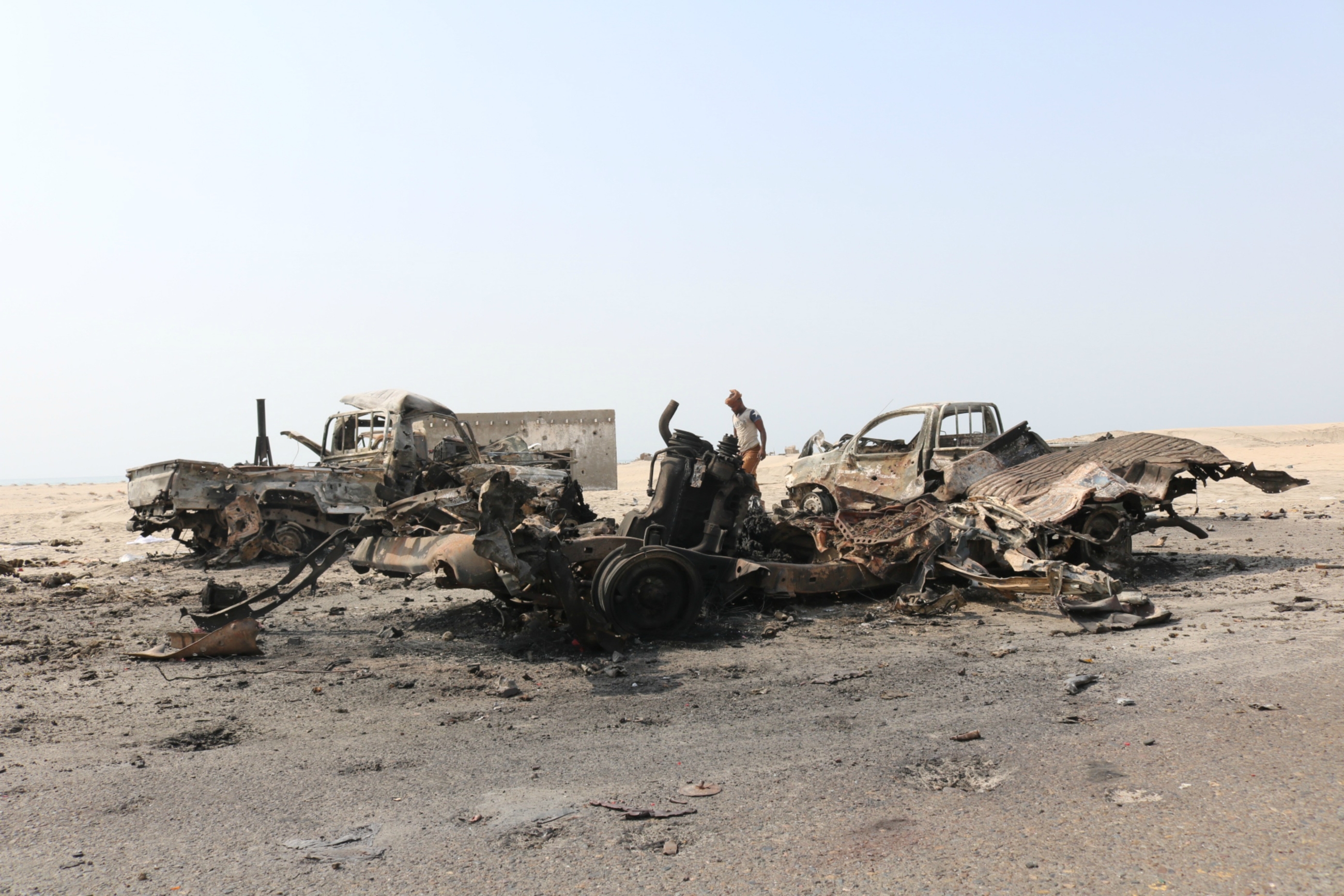
The Islamic State group claims responsibility for a suicide attack that killed six southern separatist fighters in Yemen on Friday, the group's Amaq news agency said.
A suicide bomber on a motorcycle targeted a patrol of Security Belt Forces (SBF), the military wing of the Southern Transitional Council (STC), part of a separatist front fighting Yemeni government forces for control of the key port city of Aden.
The separatists and the government are both part of a Saudi-led coalition battling the Iran-aligned Houthi movement, which took over most of Yemen's cities in 2014.
But the separatists broke with the government earlier this month, accusing it of ties to the Muslim Brotherhood-aligned Islah party and seized its temporary base of Aden.
The move has exposed deep rifts in the coalition. The Saudis back the Yemeni government, while the UAE, the alliance's second-biggest backer, funds and arms southern separatist forces.
New MEE newsletter: Jerusalem Dispatch
Sign up to get the latest insights and analysis on Israel-Palestine, alongside Turkey Unpacked and other MEE newsletters
On Thursday, the UAE said it carried out "precise and direct" air strikes against "terrorist militias" in southern Yemen.
The UAE claims the militias were responsible for the attacks on the Saudi forces fighting at Aden's airport.
Yemen's government condemned the raids, which it said had killed and wounded more that 300 of its forces and civilians.
The UAE acted in "self-defence" after being attacked by "armed groups affiliated with terrorist organisations," the UAE's Ministry of Foreign Affairs said in a statement late on Thursday.
Other parts of Aden were largely quiet on Friday after days of heavy fighting, with shops, restaurants and bakeries reopening and people attending Friday prayers.
On Thursday, Yemen's internationally recognised President Abd Rabbuh Mansour Hadi called on Saudi Arabia to help stop UAE air strikes on his temporary capital Aden as he withdraws his forces from the port city.
Hadi asked Saudi Arabia to intervene and stop what he called UAE interference and support for the SBF, according to state news agency Saba, as reported by Reuters news agency.
Hadi said that his forces had withdrawn from Aden to prevent the city from being destroyed, as fighting for control of the key port city continued.
Hadi also asked for all air strikes against Yemeni government forces to be halted.
South Yemen: Timeline of a civil war within a civil war
+ Show - Hide1 August: A missile attack claimed by the Houthis kills dozens of Security Belt Forces (SBF) officers at a military parade near Aden, including a leading SBF commander, Brigadier General Munir “Abu al-Yamama” al-Yafee. The Houthis claim responsibility, but the UAE-backed Southern Transitional Council (STC), the SBF's political wing, blame the attack on al-Islah, which it said had infiltrated President Abd Rabbuh Mansour Hadi's government and military, including the presidential guard stationed at al-Maashiq presidential palace in Aden.
7 August: Gunshots are reportedly fired at Yafee's funeral, which was held near Aden's presidential palace. Fighting breaks out between SBF fighters and presidential guards at the palace entrance. The STC claims 11 of its members were killed in the exchange of fire. Later that evening, STC Vice Chairman Hani bin Breik calls for supporters to march on the presidential palace to overthrow Hadi's government.
8 August: At least 12 people are killed in renewed clashes between the SBF and pro-Hadi forces in Aden.
9 August: Renewed clashes kill at least six civilians in Aden.
10 August: The STC captures Aden after a fierce battle with loyalist forces. At least eight civilians are killed in the fighting. The Saudi-backed government accuses the STC of staging a coup in the southern port city after its fighters seized all military camps, prompting Riyadh to call for an urgent meeting for the warring parties.
20 August: SBF fighters encircle a pro-government special forces camp in the Zinjibar, the capital of Abyan province. The special forces camp and a nearby military base both fall under the control of the SBF.
22 August: The Shabwani Elite Forces (SEF), a militia loyal to the STC, attacks government forces in the Shabwa province and captures several areas, including its capital city of Ataq.
24 August: Pro-government forces recapture Ataq.
28 August: Pro-government forces recapture Abyan province and Hadi's information minister announces Aden has been taken back and its presidential palace seized.
29 August: STC forces regain parts of Aden city and Abyan province. The UAE claims responsibility for airstrikes against what it calls "terrorist organisations", and Hadi calls on Saudi Arabia rein in the separatists, saying his forces have withdrawn from the city to prevent further destruction.
14 October: Saudi Arabia’s armed forces take control of Aden, deploying more troops to replace the Emiratis at Aden airport and military bases in the city. Official handover to a Saudi commander took place the previous week.
30 October: The UAE announces its troops have left Aden, handing over control to Saudi Arabia.
5 November: Yemen's internationally recognised government and southern separatists signed a Saudi-brokered agreement to end their power struggle.
The situation in south Yemen is constantly shifting under frequent territorial exchanges between the UAE-SBF and troops loyal to the Saudi-supported Hadi government.
Earlier on Thursday, the SBF recaptured parts of Aden city and Abyan province from fighters loyal to Hadi.
The Saudi-led and Western-backed Sunni Muslim coalition intervened in Yemen in 2015 against the Houthis, who ousted Hadi's government in the then capital Sanaa.
Divisions have spread in a war that is widely seen as a proxy conflict between Saudi Arabia and Shia Muslim regional rival Iran.
The recent increase in violence has opened a new front in the war, which has already killed tens of thousands of people, in what the UN has called the world's worst humanitarian crisis.
Middle East Eye delivers independent and unrivalled coverage and analysis of the Middle East, North Africa and beyond. To learn more about republishing this content and the associated fees, please fill out this form. More about MEE can be found here.


